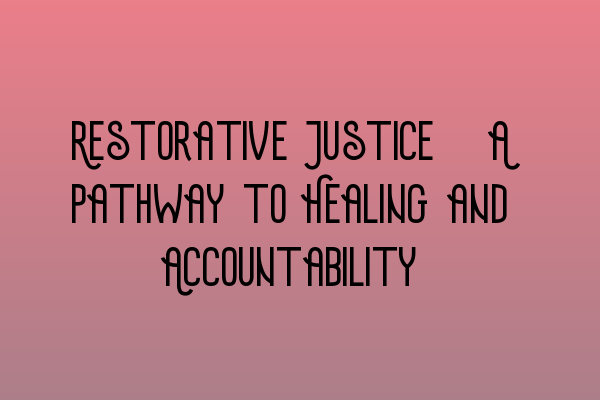Restorative Justice: A Pathway to Healing and Accountability
In our criminal justice system, the goal is not just to punish offenders, but also to promote healing and accountability. Restorative justice is an approach that aims to achieve these objectives by involving all stakeholders in the process of resolving conflicts and repairing harm. It seeks to address the needs of victims, offenders, and communities, fostering repair and rebuilding relationships.
Understanding Restorative Justice
Restorative justice is a paradigm shift from the traditional punitive model. It emphasizes dialogue, empathy, and participatory decision-making. Rather than focusing solely on punishment, it encourages offenders to take responsibility for their actions and to make amends. At the same time, it provides victims with a voice and opportunity for healing.
Restorative justice recognizes that crime not only harms individuals, but also damages relationships and communities. By bringing together all parties affected by the crime, it aims to address the underlying causes and consequences of the offense. Through facilitated conversations, victims and offenders can express their feelings, share their experiences, and jointly create resolutions that seek to meet the needs of everyone involved.
The Benefits of Restorative Justice
Restorative justice offers several benefits over traditional punitive approaches:
- Healing: Victims have the opportunity to share their pain and have their voices heard. Offenders can confront the impact of their actions, develop empathy, and take steps towards making things right.
- Accountability: By engaging in open and honest dialogue, offenders take responsibility for their actions and face the consequences. They actively participate in finding solutions and repairing the harm caused.
- Empowerment: Restorative justice empowers victims by involving them in the decision-making process, giving them a sense of control and validation. It also empowers communities by recognizing their role in supporting both victims and offenders in the healing process.
- Reduced Recidivism: Studies have shown that restorative justice can contribute to reducing repeat offenses. When offenders are directly confronted with the consequences of their actions and actively work towards repairing the harm, they are less likely to reoffend.
Restorative Justice in Practice
Restorative justice practices can take various forms, such as victim-offender mediation, family group conferences, or community circles. These processes typically involve trained facilitators who guide the conversations and ensure a safe and respectful environment.
Victim-offender mediation brings together victims and offenders in a controlled setting where they can express their feelings, receive answers to their questions, and collaboratively determine appropriate restitution. Family group conferences involve the broader support network of both the victim and the offender, encouraging a collective responsibility for the healing process. Community circles promote dialogue and understanding among community members, fostering a sense of shared accountability.
Restorative justice programs have been successfully implemented in various jurisdictions around the world. They have been shown to have positive impacts on victims’ satisfaction, offenders’ accountability, and community cohesion.
Conclusion
Restorative justice provides a meaningful alternative to punitive measures by prioritizing healing, accountability, and community involvement. It recognizes the humanity of all parties affected by crime and seeks to address the harm caused in a constructive and transformative manner. By embracing restorative justice principles and practices, we can create a criminal justice system that truly promotes healing, reconciliation, and restoration of relationships.
If you are interested in learning more about restorative justice, SQE Criminal Law & Practice Law UK offers comprehensive training courses and resources. Check out our related articles:
- SQE 1 Practice Exam Questions
- SQE 1 Practice Mocks FLK1 FLK2
- SQE 2 Preparation Courses
- SQE 1 Preparation Courses
- SRA SQE Exam Dates
